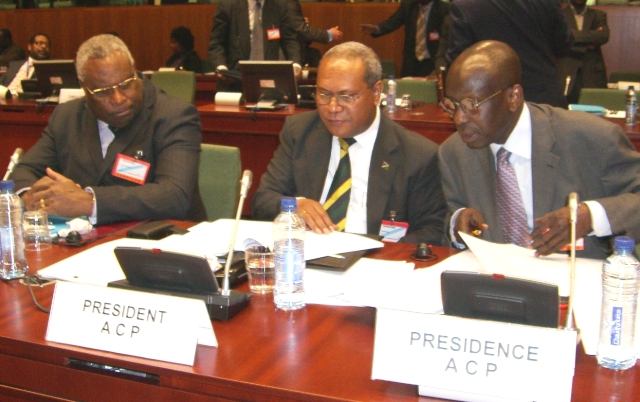 The European Union (EU) has not included in the Lisbon Treaty a crucial article that was a feature of treaties between the EU and African Caribbean and Pacific (ACP) states. The Lisbon Treaty is the new “constitution” of the EU and it will replace the previous treaties that guided the policies of the EU and the work of the European Commission (EC).
The European Union (EU) has not included in the Lisbon Treaty a crucial article that was a feature of treaties between the EU and African Caribbean and Pacific (ACP) states. The Lisbon Treaty is the new “constitution” of the EU and it will replace the previous treaties that guided the policies of the EU and the work of the European Commission (EC).
Representatives of EC have offered reasons for this omission which might have had a ring of credibility had the Caribbean not been put through the threats and demands that characterized the negotiations leading to individual Caribbean countries signing up to an unequal Economic Partnership Agreement (EPA) with the EU.
It is difficult for skeptics to take the EC at its word. Indeed, since the EC unilaterally denounced the Sugar Protocol leaving Caribbean sugar producers without a market that the Protocol had guaranteed, and since the EC further unilaterally amended the preferential terms under which Caribbean-produced bananas entered the EU market leaving banana farmers in dire circumstances, there is every reason to be ultra-cautious of actions by the EU and its Commission.
 What is not clear is why the ACP countries have not protested at the omission of the article which they were entitled to do, and which they were urged to do by at least one activist lawyer in Brussels where both the EC and ACP secretariats are located.
What is not clear is why the ACP countries have not protested at the omission of the article which they were entitled to do, and which they were urged to do by at least one activist lawyer in Brussels where both the EC and ACP secretariats are located.
It has to be assumed that the ACP representatives had good reason for not howling publicly in protest and that, at some point, they will let their publics know why they did not. On the other hand, it may very well be that they did protest but were rebuffed by the EC, and, again, they chose not to let their publics know that, once again, raw power trumped moral obligation. Then, it could be that the ACP representatives chose to do nothing at all on the basis that since the EC has unilaterally denounced what the ACP thought were other legally binding agreements, there was no point in even raising the issue, since the EU, at some point in the future, might abrogate an article in their own treaty if it did not suit them. And, the ACP would be able to do nothing about it just as they did not make a legal challenge to the denunciation of the Sugar Protocol.
To be fair to the EU and the EC, my previous paragraph is pure speculation. It may very well be that no representation was made by the ACP to the EU/EC by representatives of the ACP and therefore, the EU/EC had no reason for regarding any omission of the ACP relationship as an issue.
As background to all this, it should be pointed out that an activist lawyer in Brussells, Joyce van Genderen-Naar, wrote in March 2004 pointing out that the Article which “makes reference to the ACP countries in the previous EC/EU Treaties had been omitted from the text of the proposed Lisbon Treaty that replaces them”.
She said, paragraph 3 of Article 179 of the provisions for Development Cooperation in the current EC Treaty states that: “The provisions of this Article shall not affect cooperation with the African, Caribbean and Pacific countries in the framework of the ACP-EC Convention”.
Van Genderen-Naar went on to argue that “Article179, paragraph 3, refers to the special relationship between the EC/EU and the ACP-countries, which is the oldest and largest form of cooperation between Europe and countries from the South”. She contended that historical bonds “between Europe and the ACP-countries give Europe a special responsibility for these countries, which should not be forgotten and should be a part of the next Constitution for Europe. This responsibility is even more urgent, because after 37 years of cooperation 40 of the 79 ACP-countries still belong to the poorest countries in the world. Out of the 48 poorest countries in the world 40 are ACP-countries”. (The full text of her presentation can be read at: http://www.normangirvan.info/naar-acp-disappearance-from-lisbon/).
Very few in the ACP countries would seriously argue with van Genderen-Naar’s contention.
She advised the ACP “to make an official request to the European Commission and Members of the Convention (representatives of the European Parliament and Member States) to insert a provision concerning the ACP-EC-Cooperation in the new Constitution in view of the special relationship between the EU and the ACP, historical bonds, responsibilities and mutual interest, as agreed by EC and ACP in Article 55 of the Cotonou Agreement” which says: “The objectives of development finance cooperation shall be, through the provision of adequate financial resources and appropriate technical assistance, to support and promote the efforts of the ACP States to achieve the objectives set out in this Agreement on the basis of mutual interest and in a spirit of interdependence".
The EU is redefining itself. They are describing the Lisbon Treaty as more than a Charter; they say it is the EU Constitution. Further, they have appointed a President of the EU and a common Foreign Minister. Beyond this deepening of their relationship, it is clear that the majority of the 27 nations in the EU feel no responsibility for the former colonies of a handful; many of them believe that the EU’s obligations are to the development and prosperity of its own member states.
 EU's first President, former Belgian Prime Minister, Herman Van Rompuy, and Britain's Baroness Cathy Ashton
EU's first President, former Belgian Prime Minister, Herman Van Rompuy, and Britain's Baroness Cathy Ashton If there is no reference in the Lisbon Treaty to the ACP countries, the shift in Europe’s attitude to them – evident in the unilateral denunciation of contracts and in the tactics of threat used in the EPA negotiations – will be confirmed. So, too, will be the timidity of the ACP in exercising power that can come from joint action.
The ACP must find the strength to speak with one voice again; to resist divide and rule tactics; to eschew empty promises of aid; and to fund its own institutions particularly those which interact with the EU. If the ACP countries remain mere supplicants without demonstrating a readiness to stand up together for themselves, then they will be omitted to their detriment from more than the EU’s new arrangements.